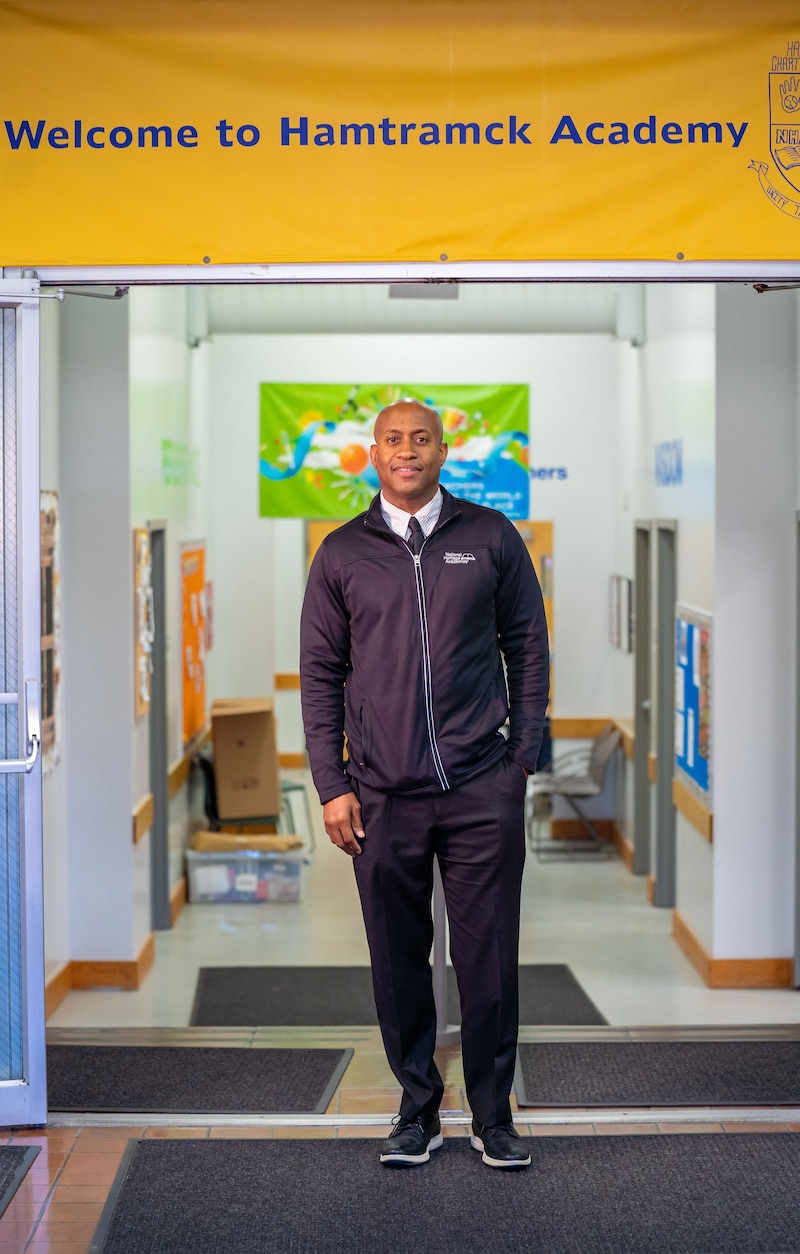To understand what drives Alvin Ward as principal of Hamtramck Academy, you might have to go back to his days as a teacher of students with learning disabilities.
Back then, while some teachers shied away from this population of students, “I thought it was the greatest opportunity to help students who need it the most.” He calls it the highlight of his teaching career.
Ward wasn’t just focused on helping students achieve academically so they could move on to the next grade. He was determined to help them to succeed in life well after they completed their K-12 education.
“For some kids, we determine whether they’re going to stay at home with their family or whether they’re going to live an independent … life,” he said. “We have to equip students with skills. That made it much more than a job. It was a moral duty for me.”

Fast forward to 2021, when the Education Trust-Midwest named Hamtramck Academy one of its first four “Building the Hope” schools (see below for more information), largely because of the success the school has seen improving academic achievement for its students, many of whom are immigrants from Bangladesh, and many of whom are from low-income homes.
Ward, who has led the school for six years after a few years as a principal in Lansing, is as inspired as ever, noting: “We’re molding kids to move on and become adults. That’s the motivator for me — to see kids come and they learn and they can have fun and they can be safe. It’s more than just a school.”
He spoke recently with Chalkbeat Detroit.
The following interview has been edited for clarity and length.
What is it about this school that stands out?
We think we have embraced and put into practice some of the best strategies that can help K-8 students everywhere, but particularly in communities with many less affluent, minority, and English-learner students.
We are a National Heritage Academy charter school serving about 550 students in grades K-8. Our school was recognized as a “Building the Hope School” because multiple student groups, including Asian students and students from low-income backgrounds, showed exceptional academic progress, exceeding the statewide proficiency rate in both English language arts and math for three consecutive years.
But we don’t do this work for awards. We do it because making sure every child succeeds is central to our mission.
We strongly believe that having real-time data combined with individualized learning are critical — but we start first by creating a culture where students feel comfortable being themselves, regardless of their backgrounds, family income, ZIP code, or home language.
Why is it so crucial to build relationships with students and their families?
Many of our students come from families who are recent immigrants and speak another language at home, and many are Muslim. Our education team members, who often do not share those characteristics, take care to embrace our students’ diversity. That includes working hard to embed their culture into our classroom instruction, diverse reading materials and in the images of people whose faces line the walls of our classrooms and hallways. We also offer Arabic and Bengali translators and make sure our communications are accessible to our families.
Honoring our students’ and families’ culture is a big part of who we are – and something we know is also a significant contributing factor to our growth and progress.
How do you involve families in the school?
We have found our families have a true passion for learning. We feed on that hunger, provide a safe, fun environment – and from there we can apply the teaching tools that meet our students’ needs.
Every classroom works to create a “social contract,” where students agree to how they want to treat their teacher and fellow students. The students themselves then hold each other accountable in a classroom that is managed by them.
Our teachers also meet students where they are academically and then tailor instruction to their needs. That means really taking active steps to create plans and set goals based on the individual child.
To truly individualize instruction, we track and monitor student data regularly to inform how we teach, making adjustments where needed. Based on what we learn, our students may then receive intervention and support or small group instruction with other students who could also benefit from additional support on a subject.
Beyond providing ongoing instructional support for students who need it, we are passionate about creating a learning environment to encourage students to accelerate. For instance, we recently launched EXCEL-ERATE, our new advanced learning program to provide learning opportunities for top-performing students who are ready to learn at an accelerated pace beyond grade level.






